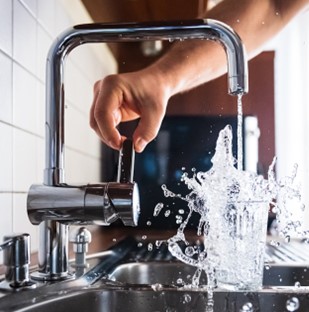Beverli Marshall received her Doctor of Business Administration from Alliant International University, a Master of Public Administration from the University of Alaska Anchorage, and a Bachelor of Arts in Sociology from California State University Bakersfield. She has worked in the public sector for over 25 years with credentials as an ICMA Credentialed Manager and a Certified Special District Manager.
In response to the economic downturn in 2009, Beverli seized the opportunity to delve into special districts and the wastewater industry as the Business Services Manager at West County Wastewater District. Subsequently, she assumed leadership roles as the General Manager (CEO) for the Sewer Authority Mid-Coastside in 2015 and later for the Valley Sanitary District in 2019. In the following article, Beverli Marshall discusses the truth behind the multi-billion-dollar bottled water industry, shedding light on its environmental footprint, the misconceptions surrounding bottled water versus tap water, and the implications for sustainability.
Beverli Marshall on Bottled Water's Environmental and Financial Impact
Today, the convenience of bottled water has become ubiquitous, offering instant hydration on the go. However, this convenience often comes at a significant cost, both to consumers' wallets and the environment they inhabit. Financially, the seemingly innocuous purchase of bottled water can add up quickly, with individual bottles often priced much higher than the cost of tap water. Over time, frequent purchases of bottled water can strain household budgets and contribute to unnecessary expenditures.
Moreover, the environmental impact of bottled water production and consumption is staggering. The manufacturing process of plastic bottles requires significant amounts of fossil fuels, contributing to carbon emissions and exacerbating climate change. Additionally, the disposal of plastic bottles poses a grave threat to the environment, with many ending up in landfills or polluting waterways and oceans. The slow decomposition of plastic further perpetuates this environmental harm, as it can take hundreds of years for plastic bottles to break down completely.
Furthermore, the extraction and transportation of bottled water from its source to consumers' hands require substantial energy inputs, further increasing its carbon footprint. This reliance on fossil fuels for production and distribution only adds to the environmental toll of bottled water consumption.
In light of these environmental and financial concerns, many consumers are reevaluating their reliance on bottled water and seeking out alternative solutions that are both cost-effective and eco-friendly. From investing in reusable water bottles to advocating for improved public water infrastructure, individuals are taking steps to reduce their reliance on single-use plastics and minimize their environmental footprint.
The Cost Disparity
Did you know that bottled water can cost up to
2,000 times more than tap water? A startling comparison reveals that while a gallon of tap water costs mere cents, a single 16.9-ounce bottle of water can amount to roughly $7.50 per gallon. Imagine the financial strain of paying thousands of times more for a resource that's readily available in our homes.
Quality Concerns
Contrary to popular belief, bottled water isn't always of superior quality compared to tap water. Beverli Marshall explains that the lack of stringent regulations and oversight means that bottled water manufacturers aren't required to disclose as much information about their products as municipal water utilities. This gap in oversight can lead to potential health risks, as evidenced by instances where bottled water has been found to contain harmful contaminants like arsenic.
Environmental Impact
The environmental toll of the bottled water industry is staggering. Each week, Americans alone purchase enough bottled water to circle the globe five times over. The production of plastic bottles requires vast amounts of oil, contributing to pollution and greenhouse gas emissions. Furthermore, Beverli Marshall says that up to 80% of plastic bottles end up in landfills or incinerators, further exacerbating environmental degradation.
 Manufactured Demand
Manufactured Demand
Beverage companies have masterfully manipulated consumer perceptions through manufactured demand. Beverli Marshall notes that by capitalizing on fears about tap water safety and promoting the allure of pristine mountain springs, they've transformed bottled water into a multibillion-dollar industry. However,
research reveals that a significant portion of bottled water originates from the same sources as tap water, rendering their claims of superiority largely unsubstantiated.
Global Water Crisis
Beverli Marshall also notes that while millions around the world lack access to clean water, the bottled water industry perpetuates inequality and exacerbates the global water crisis. By prioritizing profit over sustainability, bottled water companies perpetuate environmental degradation and exacerbate social inequities. Every minute, a child succumbs to waterborne diseases, underscoring the urgency of addressing the root causes of the global water crisis.
Taking Action
It's imperative that we take a stand against the wasteful practices of the bottled water industry. Beverli Marshall provides a few actionable steps we can take to combat this issue:
- Opt for Reusables: Invest in a reusable water bottle to reduce reliance on single-use plastics and save money in the long run.
- Advocate for Change: Rally communities, workplaces, and policymakers to ban bottled water and invest in sustainable alternatives.
- Support Water Infrastructure: Demand increased investment in water infrastructure to ensure access to clean, safe drinking water for all.
In conclusion, the bottled water industry represents a stark example of wasteful consumption and environmental degradation. By raising awareness, advocating for change, and adopting sustainable practices, we can work towards a future where access to clean water is a basic human right, not a commodity to be exploited for profit.
 Manufactured Demand
Manufactured Demand